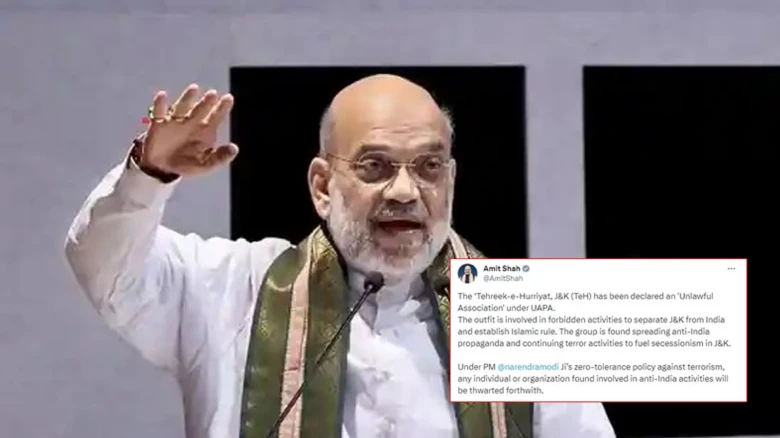Amit Shah emphasized that TeH has been spreading anti-India propaganda and conducting terrorist activities...
Digital Desk: In a significant move, the Government of India has declared 'Tehreek-e-Hurriyat, Jammu and Kashmir (TeH)' an 'Unlawful Association' under Section 3(1) of the Unlawful Activities (Prevention) Act (UAPA) 1967. Union Home Minister and Minister of Cooperation, Amit Shah, conveyed the decision through a post on 'X,' stating that the outfit is actively engaged in forbidden activities aimed at separating Jammu and Kashmir from India while seeking to establish Islamic rule.
Amit Shah emphasized that TeH has been spreading anti-India propaganda and conducting terrorist activities to fuel secessionism in Jammu and Kashmir. This action aligns with Prime Minister Narendra Modi's zero-tolerance policy against terrorism, making it clear that individuals or organizations involved in anti-India activities will face immediate repercussions.
The objective of TeH, founded in 2004 by hardcore separatist leader Syed Ali Shah Geelani, is to achieve the separation of Jammu and Kashmir from India and establish Islamic rule in the region. The organization has a history of fomenting terrorism and disseminating anti-India propaganda, posing a threat to the sovereignty, security, and integrity of the nation.
TeH, a constituent of the Hurriyat Conference led by Geelani until his resignation, has faced numerous criminal cases under various acts, including the Unlawful Activities (Prevention) Act, Arms Act, RPC, and IPC. The recent decision follows indications that both factions of the larger secessionist conglomerate, Hurriyat Conference, may face a ban under Section 3(1) of UAPA.
Established in 1993 with 26 groups, the Hurriyat Conference included pro-Pakistan and banned outfits such as Jamaat-e-Islami, JKLF, and Dukhtaran-e-Millat. The conglomerate split into two factions in 2005, with a moderate group led by Mirwaiz Umer Farooq and a hardline faction led by Syed Ali Shah Geelani.
The government had previously banned Jamaat-e-Islami and JKLF under UAPA in 2019. Investigations into terror funding revealed the alleged involvement of secessionist and separatist leaders associated with the Hurriyat Conference. Funding activities, both domestic and international, were facilitated through illegal channels, including hawala, to support separatist and terrorist activities in Jammu and Kashmir.
Several arrests were made, and individuals like Altaf Ahmed Shah, son-in-law of Geelani, businessman Zahoor Ahmed Watali, and spokespersons of both factions—Ayaz Akbar and Shahid-ul-Islam—were detained. The National Investigation Agency (NIA) probed these cases, strengthening the government's stance on banning both factions of the Hurriyat Conference under UAPA. The move reflects India's commitment to curbing activities that threaten its national security and integrity.

Leave A Comment